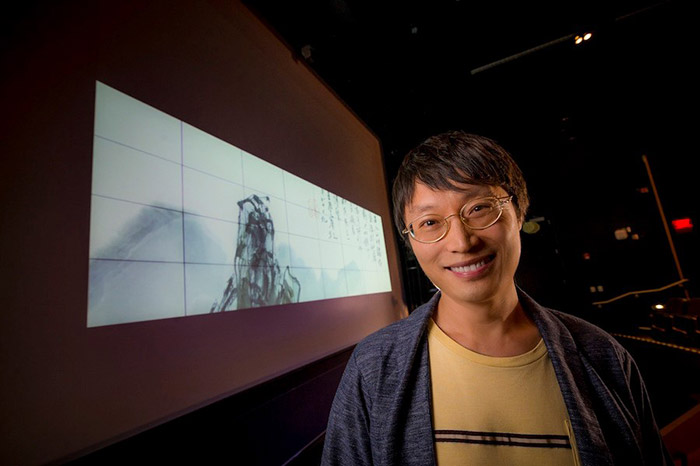UC San Diego Composer Lei Liang Receives Koussevitzky Commission Grant
San Diego, Calif., Dec. 15, 2015 — University of California, San Diego professor and composer Lei Liang, together with San Diego-based Art of Élan, a group that works to expand the scope of classical music through innovative, programming in unique performance venues, received a Koussevitzky Commission Grant from the Library of Congress for a piece that Liang will write for the Formosa Quartet, a co-sponsor of the commission. The new piece will premiere March 29, 2016 in a performance at the San Diego Museum of Art.

Liang, a Chinese-born American composer whose music is considered contemporary and non-traditional, serves as the interim chair of the UC San Diego Department of Music and is also the Composer-in-Residence for the UC San Diego Qualcomm Institute. Following studies at the New England Conservatory and at Harvard University, he embarked on a distinguished teaching career and became active as a scholar devoted to the research and preservation of traditional Asian music. He is a recipient of the prestigious Rome Prize, a Guggenheim Fellowship and has been commissioned by the New York Philharmonic and the Taipei Chinese Orchestra. His new string quartet will feature the composer’s recent research into folk songs, many of which have been important to him since childhood.
“I’m very grateful to be writing this piece for the Formosa Quartet,” Liang said. “They are truly remarkable artists with extraordinary vision. I feel very moved by their dedication to championing Taiwanese music and its cultural heritage. My long-standing research interests resonate deeply with their mission.”
Previous UC San Diego composers to win the prize are Roger Reynolds and Chinary Ung. Liang’s new piece will be based on the music of Taiwan’s aboriginal tribes. Born in China, Liang has often looked eastward for inspiration, and the quartet shares his interest. The group was founded in 2002 for a tour of Taiwan, and its members all have family and/or artistic ties to Taiwan. Liang, said that he finds fresh inspiration in the indigenous music of Taiwan’s aboriginal tribes.
“I have been interested in the study of Asian folk music since I was in high school,” Liang said. “The most notable example might be the CD of Mongolian chor-player Serashi whose recordings I helped to re-discover and produce. The study of Mongolian music inspired me to compose a series of works. I was particularly interested in the functionality of different voices, and the fluid interchangeability of their roles. I incorporated and developed this concept in my own works.”
Liang has been building a creative relationship with Art of Élan since he met its executive director Kate Hatmaker, also a violinist with the San Diego Symphony, in 2009.
“I’ve had the good fortune to work on a few projects with Lei Liang already,” Hatmaker said, who played on Liang’s CD Milou and was concertmaster/first violinist for the UC San Diego concert and recording of his ensemble piece, Verge. “His music is incredibly colorful and imaginative. I can't wait to hear what this latest string quartet will sound like!”
Art of Élan has timed the Koussevitzky commission to coincide with the Formosa Quartet’s two-year residency. Plans are in the works for the piece to be performed at UC San Diego next year, and for the quartet to play it in Taiwan and other international locales on its 2016 concert tour. Along with composing and premiering the new music, Liang and the quartet will record a new CD next year inspired by Hungarian and Taiwanese folk traditions.
The Koussevitzky commissioning program is designed for established composers whose work demonstrates considerable merit and for orchestras and chamber groups that have a record of excellence in the performance of contemporary music. Serge Koussevitzky, conductor of the Boston Symphony Orchestra from 1924 to 1949, was a champion of contemporary music who established the Koussevitzky Foundation in the Library of Congress to continue his lifelong commitment to composers and new music.
For more information, about UC San Diego’s Department of Music and Lei Liang, please visit the music department’s website.
Related Links
UC San Diego Department of Music
Media Contacts
Dirk Sutro
(858) 534-4830
dsutro@ucsd.edu
